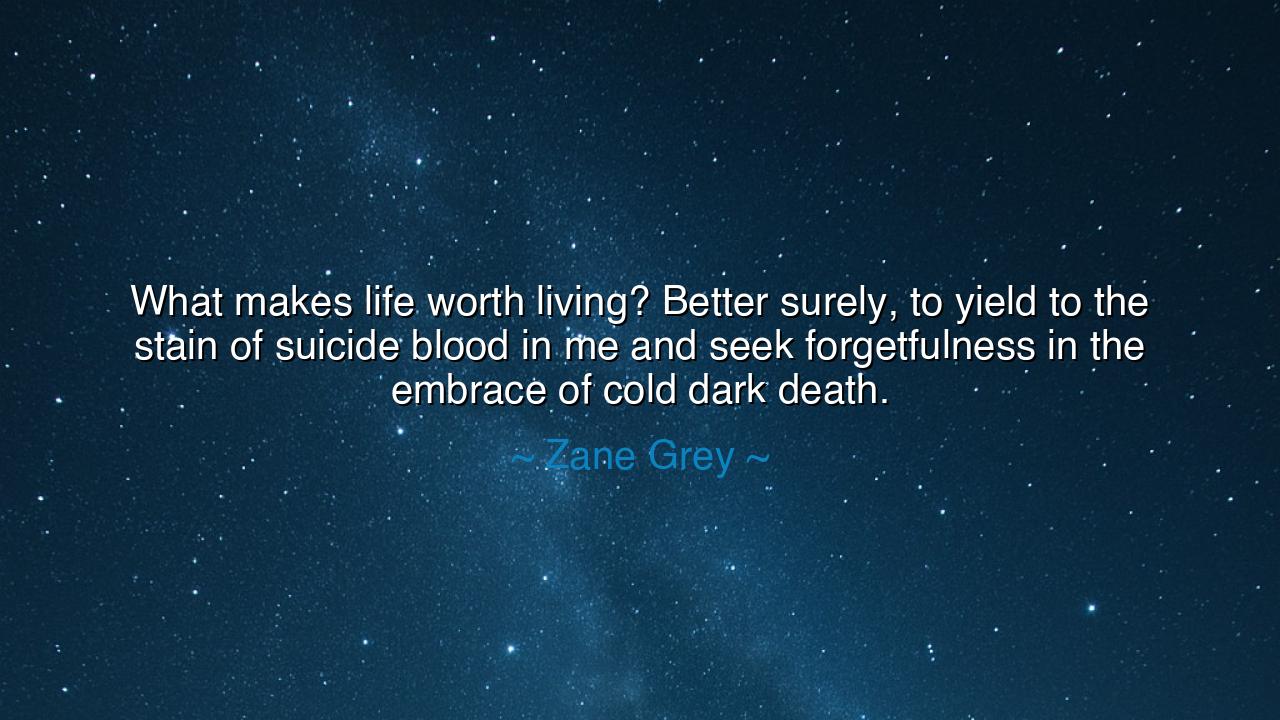
What makes life worth living? Better surely, to yield to the
What makes life worth living? Better surely, to yield to the stain of suicide blood in me and seek forgetfulness in the embrace of cold dark death.






“What makes life worth living? Better surely, to yield to the stain of suicide blood in me and seek forgetfulness in the embrace of cold dark death.” Thus wrote Zane Grey, the famed author of the American frontier, whose pen often captured the rugged splendor of the wilderness and the silent battles of the human soul. In this haunting reflection, Grey gives voice to a darkness that visits all who walk through despair — the terrible whisper that asks whether life itself is worth the suffering it demands. His words are not an invitation to death, but a confession of torment — the cry of a man who has gazed into the abyss of meaninglessness and sought, even there, to understand what holds the soul to life.
To grasp the depth of Grey’s words, one must see beyond their melancholy. Here speaks not the weak, but the weary — one who has borne the weight of existence, who has felt both the ecstasy of creation and the futility of loss. “What makes life worth living?” is not a question born of curiosity, but of anguish — the questioning of one who has tasted the bitterness of human frailty. Yet even in his despair, there lies a profound honesty: he does not veil his pain behind illusion, nor does he pretend strength where none remains. In this way, Grey stands in a long lineage of souls — from Job in his ashes to Hamlet in his solitude — who dared to face the darkness within and name it aloud.
The “stain of suicide blood” that he speaks of is the ancient inheritance of suffering — the shadow that trails every human being who feels too deeply. Grey, like many artists and thinkers before him, bore within him the dual fire of creation and destruction. For those who feel the world’s beauty with rare intensity also feel its cruelty just as sharply. To them, life’s joy and sorrow are not two notes but one trembling chord, vibrating between rapture and despair. To contemplate death, then, is not always cowardice, but the mind’s desperate search for peace when hope seems far away.
Throughout history, many have walked this same precipice. Virginia Woolf, who filled her pages with light and motion, was haunted by the same darkness that eventually claimed her. Vincent van Gogh, whose paintings blazed with color and spirit, wrestled against despair until the end. These were not souls devoid of strength, but souls too sensitive to endure a world that often meets passion with indifference. Like Grey, they sought forgetfulness in the embrace of death, not because they despised life, but because they loved it too much to bear its absence of meaning.
Yet, even as Grey’s words tremble with hopelessness, they carry a paradoxical power. To ask what makes life worth living is to acknowledge that something, perhaps hidden, still might. The very act of questioning shows that the soul has not fully yielded — that a spark remains amid the ashes. For those who cry out in despair are still engaged in the struggle for purpose. Their longing for forgetfulness reveals not a hatred of life, but a desperate hunger for peace. And within that longing lies the seed of redemption: the recognition that life’s worth may not be found in ease, but in endurance.
It is said that Zane Grey, though often haunted by depression, continued to write, to fish, to travel, to seek solace in the vastness of nature. In this persistence lay his quiet victory — for even as he contemplated death, he chose, again and again, to live a little longer, to write another page, to cast his line into the eternal waters. His despair did not destroy his art; it deepened it. From his pain came stories of courage, wilderness, and the eternal fight between man and his own shadows. In this, he mirrors the timeless truth: that to live, even while broken, is the noblest form of resistance.
Lesson: There will come a time when every soul asks Grey’s question — What makes life worth living? When that hour comes, do not rush to answer. Sit with the question. Let it burn and hollow you until only truth remains. Remember that even the deepest night holds stars, though they are faint. Seek not forgetfulness, but understanding. Find beauty in endurance, meaning in the smallest act of love, and courage in the simple act of staying. For life’s worth is not measured by its joy alone, but by the heart’s ability to keep beating amid the storm.
So, remember the wisdom hidden in Zane Grey’s despair: that to face darkness honestly is not to be consumed by it, but to know its shape — and, in knowing it, to defy it. The “cold dark death” he imagined waits for all, but life — fierce, fleeting, radiant — waits only for those who choose it. Therefore, live not because it is easy, but because it is hard; not because it is safe, but because it is yours. And in the struggle to find what makes life worth living, you will discover that it is the struggle itself that gives life its worth.






AAdministratorAdministrator
Welcome, honored guests. Please leave a comment, we will respond soon